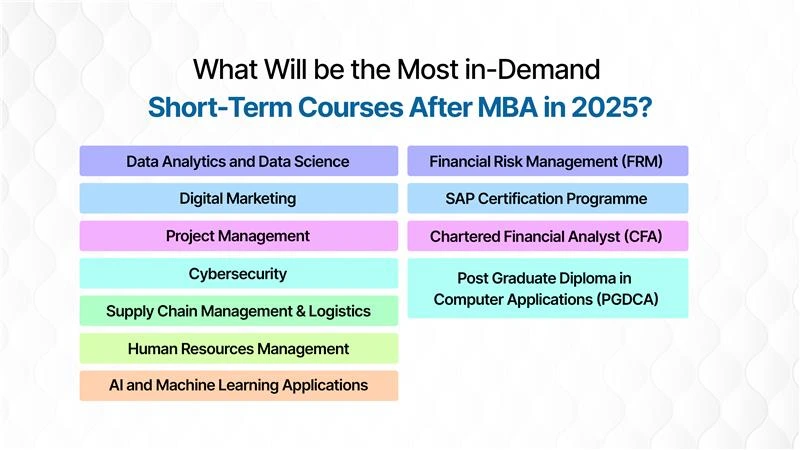What to do after an MBA?

A Master of Business Administration degree is a significant achievement. The Master of Business Administration opens many career opportunities. This can cause confusion as to what to do after MBA?. Students usually wonder what they should do next after completing their MBA. Students often search for courses to enhance their knowledge of specific fields. Further education and certifications not only enhance your skills but will also make you more attractive to employers.
The next steps after completing an MBA may seem overwhelming. There are many career options after MBA. You can have a rewarding career by exploring career paths, pursuing specialized training, and networking. Remember that you have many options, and an MBA is a good step towards a rewarding and successful career. This blog will explore the various courses after MBA and career options that you can take to advance your career after earning an MBA. The courses after MBA and specializations are listed below based on your interests.
Why should you consider taking a course after MBA?
It is an important achievement to earn an MBA. You will gain solid knowledge of strategic planning and business management. The business world is constantly changing and by continuing to educate yourself, you can keep up with the changes. Take a look at these compelling reasons to take a course after your MBA.
- Keep up with the Market: The business world changes rapidly, and new methods and technologies are always emerging. Taking additional courses after MBA will improve your skills. You will remain competitive. You can adapt to changes in an industry and gain insights into new trends and tools.
- You can specialize in a particular area: An MBA can give you an excellent understanding of business, but it may not be enough to cover all your interests. Specialized courses can help you gain a better understanding of subjects like digital marketing or supply chain management. You can improve your skills and become more attractive to employers by specializing in certain industries.
- Improve Your Employability: Many companies look for candidates with a continuous learning mindset. Your resume will be enhanced by the additional courses that you complete. These courses will also demonstrate your commitment to personal and professional growth. With certifications, you can get better job opportunities. You can get an edge on the job market with certifications.
- You can increase your professional network by taking courses: You’ll meet professionals with similar interests and goals. You can build relationships that could lead to job opportunities, collaborations, or mentorships. Networking can be an excellent tool if you’re looking to change careers or industries.
- Learn Practical Skills: Many courses are based on practical experiences and applications. This can bridge the gap between your MBA’s theoretical knowledge and its application in practice. You can make a greater contribution to your workplace by learning practical skills.
- Discover New Career Options and Interests: Additional courses will help you to discover new career options. You may find you are more satisfied with your job and have opportunities that match your goals.
- Prepare yourself for leadership positions: Take courses in topics like negotiation, organizational behaviour, and strategic planning. This will prepare you for a career as a leader or manager. These courses will help you improve your leadership abilities by improving your ability to make decisions.
- Keep your skills updated: As more professionals seek advanced training, it is possible to stand out. Employers look for candidates who have experience and are committed to learning.
What should you consider before choosing courses after MBA?

- Before choosing a career path, consider your future: Decide what knowledge and skills you will need to reach your goals.
- Research the latest trends in an industry: Doing thorough research will help you choose a relevant and in-demand course.
- Skill Gaps: Determine the skill gaps that you may have. These could be filled through additional education. Concentrate on the areas in which you believe you should be an expert.
- Course Accreditation: Make sure the institution that offers the course is reputable and well-recognized in the field.
- Learning Options: Online, hybrid, or in-person. Choose the structure that fits best with your schedule.
- Networking opportunities: Look out for courses that offer networking opportunities. Building connections is as important as learning the material.
- Duration and fee: Determine how much money and time you can realistically invest in your education, without compromising on other obligations.
- Faculty Experience: Research the background and experience of instructors. The more experienced instructors and industry experts who teach the course are the best.
- Reviews: You can get an idea of the course quality by reading reviews written by former students.
- Additional Certifications: Check if you can get certifications to enhance your resume or demonstrate expertise in certain areas.
Why take short-term courses after MBA?
There is no doubt that an MBA is already an advanced business degree that you have achieved. These short-term courses will strengthen your fundamental knowledge and have several benefits after earning an MBA:
Skill-Enhancement: Short-term courses can help you gain new skills quickly or enhance your existing expertise in areas in which there is a high demand on the job market. You can become more attractive to employers and competitive.
Flexible and convenient: Short-term courses can be taken online in a variety of formats. This allows you to balance your learning with work obligations.
Cost-Effective: Short-term courses are often more cost-effective than longer degree programs. You can increase your knowledge and improve your skills without making a large financial commitment.
Career Changes: Short-term courses are a great way to gain the knowledge you need for a career change.
What will be the most in-demand short-term courses after MBA in 2025?

As the job market continues to change, MBA graduates will be required to take a variety of short-term courses. Here are some areas that could be of interest:
Data Analytics and Data Science:
The courses after MBA include Data Analytics programs and Data Science provide comprehensive knowledge in data manipulation, statistical analyses, and interpretation for generating actionable insights. These programs cover many topics, including data mining and Machine Learning.
| Duration | Career Opportunities |
| 3-6 months. Focus on specific tools and techniques. |
Data Scientist, Business Analyst, Machine Learning Engineer, Data Engineer, Data Consultant. |
Digital Marketing:
The top 10 courses after MBA include the Digital Marketing Course offered by Digital Nest School of Business, focus on online marketing strategies and tactics that are essential in today’s digital age. Curriculum includes areas such as search engine optimization, content marketing, email marketing, pay-per-click advertising (PPC), analytics, and social media marketing.
| Duration | Career Opportunities |
|
Certification programs: 3 to 6 Months Degree programs: Between 1 and 2 years |
Digital Marketing Manager, SEO Specialist, Social Media Manager, Social Media Specialist, Content Writer, Email Marketing Specialist, PPC Specialist, Data Analyst. |
Project Management:
The list of courses after MBA includes Project Management courses that cover the principles, tools, and methods necessary to manage projects effectively. Project management, risk management, and execution are frequently key topics. Budgeting, stakeholder communications, quality management, and risk management are all important.
| Duration | Career Opportunities |
|
Short-term courses Duration: Usually last between 3 and 6 months Duration of the degree program: Between 1 and 2 years |
Project Managers, Program Managers, Project Coordinators, Quality Assurance Managers, Scrum Masters, Agile coaches, and Risk managers. |
Cybersecurity:
The top 10 courses after MBA include Cybersecurity. This course covers a wide range of topics that are essential to protecting computer systems, networks, and data against malicious attacks. Curriculum includes cryptography, risk management, and network security.
| Duration | Career Opportunities |
|
3 to 6 months |
Cybersecurity Analyst (Cybersecurity Consultant), Ethical Hacker (Ethical Hacker), Network Security Engineer (Network Security Engineer), Security Consultant, Chief Information Security Officer(CISO), Security Software Developer. |
Supply Chain Management & Logistics:
The best courses after MBA include Supply Chain Management, which is a field of critical importance that includes the planning and management of all activities related to sourcing, procurement, and conversion. It also involves logistics management. The movement and storage of raw materials, finished goods, and work-in-progress inventory from the point of origin up to the point of consumption.
| Duration | Career Opportunities |
| 3 to 6 months |
Logistics Coordinator, Supply Chain Manager (Supply Chain Manager), Inventory Manager, Operations manager, Transportation manager, Warehouse Manager. |
Human Resources Management: The Human Resources Management Course covers a wide range of topics that relate to effectively managing the human capital in an organization.
| Duration | Career Opportunities |
|
Short-term Course: 2 – 3 months Certificate Programs: 6 to 12 months |
HR Consultant, Talent Acquisition Manager (HR Analyst), HR Manager, Recruitment specialist, Training and development manager, Compensation and benefits manager, Employee relations Manager, HR Consultant. |
AI and Machine Learning Applications: This course covers topics related to artificial intelligence and machine-learning techniques in various industries.
| Duration | Career Opportunities |
| Short-term Course: 2 – 3 months | Machine Learning Engineer, Data Scientist, AI Research Scientist, Business Intelligence Analyst. |
Financial Risk Management (FRM):
Courses after the MBA include Financial Risk Management. It is a program that equips individuals with the skills and knowledge needed to identify, evaluate, and manage financial risk within an organization. FRM covers a wide range of topics, including risk management frameworks and credit, operational, and regulatory risks. This course includes both quantitative and qualitative methods of risk assessment.
| Duration | Career Opportunities |
|
Short-term Course: 6 months to 1 year |
Risk Managers, Financial Analysts, Compliance Officers, Portfolio Managers, Credit Risk Analysts, Risk Management Consultants, Research & Strategy Planners. |
SAP Certification Programme:
SAP courses (Systems, Applications, and Products in Data Processing) are designed to provide learners with the knowledge and skills needed to use SAP solutions and products in different business environments. These courses include both theoretical and practical aspects of SAP software. SAP is a widely used enterprise resource planning (ERP) system, data management tool, and business process optimizer across many industries. This certification program is designed for students who are interested in pursuing a career within the business applications industry.
| Duration | Career Opportunities |
|
Short-term courses: Between 1 to 3 months |
SAP Consultants, SAP developers, Business Analysts, etc. |
Chartered Financial Analyst (CFA):
Another course in the list of courses after the MBA includes CFA. It is a globally recognised certification for professionals in finance and investments. The CFA program focuses on financial analysis, investment management, portfolio management, and other related areas. Candidates must pass three levels (Level I II, and III) of examinations to earn the CFA title. The CFA curriculum covers topics like ethics, quantitative methods, and economics. It also includes financial reporting and analysis.
| Duration | Career Opportunities |
| 1.5 years |
Investment Managers, portfolio managers, risk managers, research analysts, wealth managers, equity analysts, corporate finance analysts, and auditors. |
Post Graduate Diploma in Computer Applications (PGDCA):
The Post Graduate Diploma in Computer Applications is designed to give students a solid foundation in computer science and its application in different fields. This program covers topics like programming languages, databases, software engineering, and web technologies.
| Duration | Career Opportunities |
|
1 year |
Software Developer, Web Developer, Database Administrator, System Analyst, Network Administrator, IT Manager, Software Tester, Data Analyst, Technical Support Executive. |
Highest Paying Job Opportunities after MBA
MBA degrees are among the most sought-after by students. MBA degrees are available in a variety of specialisations, such as Sales & Marketing, Data Analytics, Project Management, Cyber Security, Supply Chain Management, Human Resources, and more. The specialisation determines the career opportunities available after an MBA. Below are some of the best career options after an MBA.
- Digital Marketing Manager: ₹3.2 Lakhs to ₹20.0 Lakhs per year
- Financial Analyst/Manager: ₹4.0 Lakhs to ₹33.3 Lakhs per year
- Risk and Insurance Manager: ₹3.4 Lakhs to ₹33.0 Lakhs per year
- Payroll Manager: ₹4.5 Lakhs to ₹26.1 Lakhs per year
- Supply Chain Manager: ₹3.5 Lakhs to ₹30 Lakhs per year
- Logistic Manager: ₹3.1 Lakhs to ₹20.8 Lakhs per year
- Operations Manager: ₹3.2 Lakhs to ₹22 Lakhs per year
- HR Manager: ₹3.2 Lakhs to ₹19.4 Lakhs per year
- Administrative Service Manager: ₹2.2 Lakhs to ₹14.1 Lakhs per year
- International Finance Manager: ₹12.0 Lakhs to ₹70.0 Lakhs per year
- Hospital Administrator: ₹1.5 Lakhs to ₹13.5 Lakhs per year
Conclusion
MBA graduates must consider taking additional courses to align their career goals with emerging trends. This blog has the top 10 courses after MBA for 2025 that will not only improve skill sets but also enhance employability, especially in fields like data analytics, digital marketing, and financial management. MBA graduates with additional qualifications who choose them strategically can get an edge in the business world. They will be able to adapt in a fast-paced work environment and reach their career goals. They will be better equipped to face the challenges of tomorrow by embracing continual learning.

